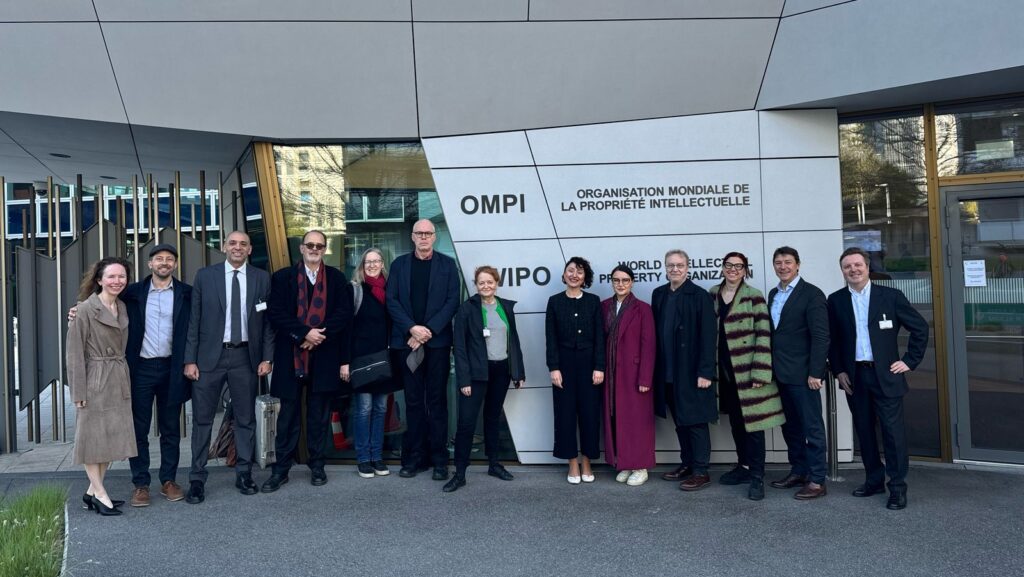As usual IPA brought a strong delegation to WIPO including Anne Bergman-Tahon (FEP, EU), Gvantsa Jobava (GE), Salome Maghlakelidze (GE), Catriona McCleod Stevenson (UK), Ahmed Rashad (EG), Glenn Rollans (CA), Jessica Sänger (DE), and Peter Schoppert (SG).
IPA President, Gvantsa Jobava, took the floor to share IPA’s position on the discussions around exceptions and limitations. The delegation also had the opportunity to meet with WIPO representatives and officials, as well as Member State representatives and ambassadors, throughout the week-long event.
On Thursday IPA hosted their own side event “Who is Writing?: Rights and responsibilities”, led by NUS Press director Peter Schoppert following an introduction by Jobava, and Catrional McCleod Stevenson, the co-chair of IPA’s Copyright Committee.
SCCR 46 opened with a new Chair, with Vanessa Cohen (Costa Rica) succeeding Adriana Moscoso (Spain, now the General Manager of GESAC) but no-one filling her vacant vice-chair role.
Day 1 began as always with the accreditation of new oberserves, which included the IPA Associate member, the African Publishers Network (APNET).
The discussions on the Broadcasting Treaty started with a brief presentation of modifications to the draft Treaty text, followed by a round of remarks from Regional Groups, Member States and a few observers on the progress and/or stagnation of the Treaty, before discussions were taken into informal meetings.
The agenda items on Limitations and Exceptions started at end of day two with the chair seeking to “shake things up” but with a large number of delegations taking the floor to voice differing opinions. Jobava urged member states to be resolute in their support of the cultural and creative sector and reiterated IPA’s belief that the current international framework is sufficient and therefore there is no need for additional international legal measures. Informal discussions followed.
On day four, proceedings moved on to the “Other Matters” agenda, comprising a discussion on Public Lending Rights, Cote d’Ivoire’s Proposal for a Study on the Rights of Audiovisual Authors and their Remuneration for the Exploitation of their Works and an update on the Study on the Rights of Stage Directors of Theatrical Productions. For the rest of the day, Artificial Intelligence became key focus of the rest of the day, with IPA’s side event followed by an information session on Copyright and Generative Artificial Intelligence.
IPA’s side event “Who is writing? Rights and responsibilities in an AI-powered world” featured Peter Schoppert, the Director of NUS Press in Singapore, who was introduced by IPA President Gvantsa Jobava, and Co-Chair of IPA’s Copyright Committee Catriona Macleod Stevenson. In his speech, Schoppert highlighted the intrinsic link between literature and technological progress and opened up the question about “Who speaks when the AI creats its output”.
The Information Session on Copyright and Generative Artificial Intelligence consisted of a number of presentations by Member States and different platforms. The proceedings closed with WIPO DDG Forbin highlighting the risk of legal fragmentation as Member States tackle AI.
The last day of SCCR closed the ‘Other Matters’ agenda item including Copyright in the Digital Environment, Artist’s Resale Right and a new proposal from Canada for a Study on Copyright Protection of Technical Standards as the main topics. The presentation by Professor Sam Ricketson about part 2 of the WIPO Toolkit on Artist’s Resale Right was generally well received, but couldn’t change long-standing member state positions. A proposal by Morocco to have a regional conference about the issue was welcomed and GRULAC continued its call for including Copyright in the Digital Environment to become a standing item. This was followed by a brief presentation by Canada of its proposal for a Study on Copyright Protection of Technical Standards.
The final day negotiations on next steps lasted until late in the night. The plenary resumed for its last session shortly before 3 am. Chair Cohen committed to prepare a roadmap on exceptions and limitations and, with the exception of the Public Lending Right, all other issues will continue to be on the agenda.
Read our daily blog posts here: SCCR46

